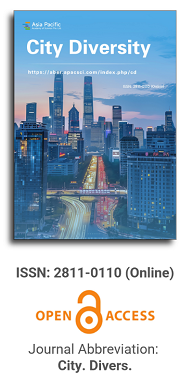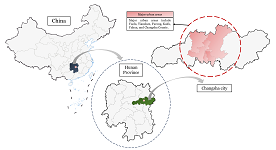
Asia Pacific Academy of Science Pte. Ltd. (APACSCI) specializes in international journal publishing. APACSCI adopts the open access publishing model and provides an important communication bridge for academic groups whose interest fields include engineering, technology, medicine, computer, mathematics, agriculture and forestry, and environment.

As China's pillar industry, the property market has suffered a considerable impact in recent years, with a decline in turnover and many developers at risk of bankruptcy. As one of the most concerned factors for stakeholders, housing prices need to be predicted more objectively and accurately to minimize decision-making errors by developers and consumers. Many prediction models in recent years have been unfriendly to consumers due to technical difficulties, high data demand, and varying factors affecting house prices in different regions. A uniform model across the country cannot capture local differences accurately, so this study compares and analyses the fitting effects of multiple machine learning models using February 2024 new building data in Changsha as an example, aiming to provide consumers with a simple and practical reference for prediction methods. The modeling exploration applies several regression techniques based on machine learning algorithms, such as Stepwise regression, Robust regression, Lasso regression, Ridge regression, Ordinary Least Squares (OLS) regression, Extreme Gradient Boosted regression (XGBoost), and Random Forest (RF) regression. These algorithms are used to construct forecasting models, and the best-performing model is selected by conducting a comparative analysis of the forecasting errors obtained between these models. The research found that machine learning is a practical approach to property price prediction, with least squares regression and Lasso regression providing relatively more convincing results.
URBAN immigrant diversity and entrepreneurial choice
Vol 2, Issue 1, 2021
Download PDF
Abstract
Keywords
References
- Alesina A, Harnoss J, Rapoport H. Birthplace diversity and economic prosperity. Journal of Economic Growth. 2016; 21(2): 101-138. doi: 10.1007/s10887-016-9127-6
- Easterly W, Levine R. Africa’s Growth Tragedy: Policies and Ethnic Divisions. The Quarterly Journal of Economics. 1997; 112(4): 1203-1250. doi: 10.1162/003355300555466
- Collier P. Implications of ethnic diversity. Economic Policy. 2001; 16(32): 128-166. doi: 10.1111/1468-0327.00072
- Kemeny T, Cooke A. Spillovers from immigrant diversity in cities. Journal of Economic Geography. 2017; 18(1): 213-245. doi: 10.1093/jeg/lbx012
- Ottaviano GIP, Peri G. The economic value of cultural diversity: evidence from US cities. Journal of Economic Geography. 2005; 6(1): 9-44. doi: 10.1093/jeg/lbi002
- Ashraf Q, Galor O. Cultural Diversity, Geographical Isolation, and the Origin of the Wealth of Nations. National Bureau of Economic Research; 2011. doi: 10.3386/w17640
- Peri G. The Effect of Immigration on Productivity: Evidence from US States. Review of Economics and Statistics. 2012; 94(1): 348-358. doi: 10.1162/REST_a_00137
- Acs ZJ, Audretsch DB, Lehmann EE. The knowledge spillover theory of entrepreneurship. Small Business Economics. 2013; 41(4): 757-774. doi: 10.1007/s11187-013-9505-9
- Sun B, Zhu P, Li W. Cultural diversity and new firm formation in China. Regional Studies. 2019; 53(10): 1371-1384. doi: 10.1080/00343404.2019.1566700
- Niebuhr A. Migration and innovation: Does cultural diversity matter for regional R&D activity? Papers in Regional Science. 2010; 89(3): 563-586. doi: 10.1111/j.1435-5957.2009.00271.x
- Ozgen C, Nijkamp P, Poot J. The Impact of Cultural Diversity on Innovation: Evidence from Dutch Firm-Level Data. SSRN Electronic Journal. Published online 2011. doi: 10.2139/ssrn.1941152
- Lazear EP. Globalisation and the Market for Team‐Mates. The Economic Journal. 1999; 109(454): 15-40. doi: 10.1111/1468-0297.00414
- Alesina A, La Ferrara E. Participation in Heterogeneous Communities*. Quarterly Journal of Economics. 2000; 115(3): 847-904. doi: 10.1162/003355300554935
- Alesina A, Ferrara EL. Who Trusts Others? Journal of Public Economics. 2002; 85(2): 207-234. doi: 10.1016/S0047-2727(01)00084-6
- Dai Y, Zhang J, Zeng Y, Pan Y. Social capital and enterprise debt financing. China industrial economy; 2009. pp. 99-108.
- Wang D. Work experience of foreign funded enterprises and entrepreneurial activities of Entrepreneurs: Evidence from household surveys in China. Management world; 2014. pp. 136-148.
- Kidd MP. Immigrant wage differentials and the role of self‐employment in australia*. Australian Economic Papers. 1993; 32(60): 92-115. doi: 10.1111/j.1467-8454.1993.tb00133.x
- Booth AL, Nolen P. Gender Differences in Risk Behaviour: Does Nurture Matter? The Economic Journal. 2012; 122(558): F56-F78. doi: 10.1111/j.1468-0297.2011.02480.x
- Taagepera R, Lee Ray J. A Generalized Index of Concentration. Sociological Methods & Research. 1977; 5(3): 367-384. doi: 10.1177/004912417700500306
- Dong Z, Wei X, Zhang T. Entrepreneurship and unemployment: Empirical test of refugee effect and entrepreneur effect. Economic review; 2012. pp. 80-87.
- Qu Z, Guo S. Registered residence and Entrepreneurship: A study on the difference of self employment between urban and rural residents -- Evidence from cgss2008. China's economic problems; 2017. pp. 72-86.
Supporting Agencies
Copyright (c) 2021 Lingzheng Yu, Shiyan Lou, Jiannan Wang, Xiahai Wei

This work is licensed under a Creative Commons Attribution 4.0 International License.

This site is licensed under a Creative Commons Attribution 4.0 International License (CC BY 4.0).

Prof. Mehmet Cetin
Kastamonu University,
Turkey
Polish Scientific Bibliography

